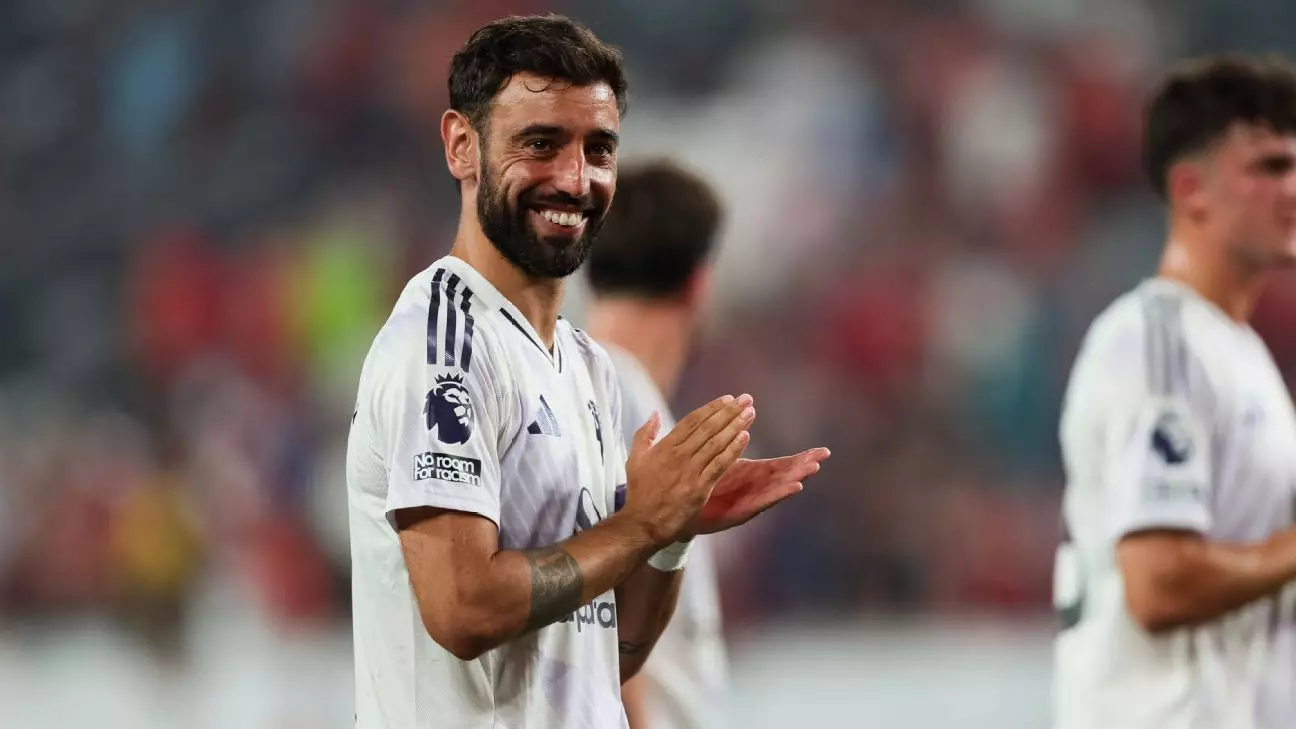In the summer of uncertainty, Manchester United found itself at a crossroads with Bruno Fernandes. The Portuguese midfielder, an undeniable electric force on the pitch, was contemplating a lucrative move to Saudi Arabia’s Al Hilal. The allure of financial windfalls is powerful in modern football, yet Fernandes’s choice to remain at Old Trafford exemplifies a commitment that transcends monetary incentives. This decision signifies more than loyalty; it reflects a recognition of his central role in United’s ambitions. His presence embodies the resilience and passion necessary for a team eager to reclaim its former glory.
Fernandes’s departure could have created a void difficult to fill, not just in tactical terms but in leadership spirit. The club’s faith was rewarded as Fernandes’s influence extended beyond goals and assists. His steadfastness acted as a catalyst for United’s renewed confidence and on-field chemistry, reminding us that sometimes, the most critical decisions stem from the heart rather than the wallet.
Redefining Leadership and Tactical Flexibility
Under the guidance of Ruben Amorim, Manchester United is shifting towards a more versatile tactical setup that leverages Fernandes’s multifaceted abilities. Historically deployed as a creative playmaker, Fernandes is increasingly used as a deep-lying midfielder, orchestrating play from a deeper position. The New United coach’s experiments—such as deploying Kobbie Mainoo and Manuel Ugarte—highlight a strategic evolution, positioning Fernandes to influence both attack and build-up from the midfield.
This tactical adjustment not only broadens United’s attacking options but also underscores Fernandes’s adaptability. His willingness to evolve his game demonstrates a leader’s mindset—one that prioritizes team success over personal glory. Fernandes’s ability to adapt to various roles, whether as a No. 10 or a deep-lying presence, is a testament to his football intelligence and leadership qualities. His willingness to embrace responsibilities and sacrifice some personal comfort for the collective good exemplifies true leadership.
The Challenges of Leadership: Balancing Expectations and Frustration
While Fernandes exudes confidence and dedication, the journey to consistent excellence is fraught with challenges. Amorim notes that Fernandes sometimes becomes frustrated, especially when circumstances limit his influence or when he perceives gaps in the team’s structure. This passion, while a vital trait, can sometimes threaten focus if not carefully managed.
Fernandes’s tendency to overextend himself in pursuit of victory is both his strength and weakness. He is inherently a workhorse, often sacrificing personal comfort and playing through pain, which tests his resilience. However, this relentless drive can lead to moments of frustration or lapses in concentration, potentially undermining team harmony. Recognizing the need for complementary support and strategic direction is crucial if Fernandes’s leadership is to translate into sustained success.
Furthermore, Fernandes’s role in United’s evolving tactical landscape requires a fine balance. He must learn patience and restraint—waiting for the right moments rather than forcing plays—qualities that separate good leaders from great ones. His journey towards mastering this balance will determine how convincingly he steers Manchester United through its rebuilding phase.
Fernandes’s story at Manchester United exemplifies the importance of unwavering resolve and adaptability in modern football. His decision to stay, coupled with his willingness to evolve within the team’s tactical framework, fuels optimism for the club’s prospects. Yet, true leadership demands more than just moments of brilliance; it requires patience, self-awareness, and the ability to channel frustrations productively.
In Fernandes, Manchester United possesses more than a talented midfielder—they have a symbol of perseverance and commitment. As the club aims to re-establish itself among Europe’s elite, Fernandes’s unwavering spirit and adaptability will be pivotal in shaping its future trajectory. His journey underscores that sometimes, the most profound leadership arises from staying committed amidst temptation, continuously pushing boundaries, and inspiring those around him to do the same.

